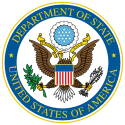
The American Film Program is a Cultural Exchange Program provided by the U.S. Department of State's Bureau of Educational and Cultural Affairs.

The American Film Program is a Cultural Exchange Program provided by the U.S. Department of State's Bureau of Educational and Cultural Affairs.
The American Film Program singles out those videos[ clarification needed ] that it views reflect core American principles, such as "individualism, tolerance, ethnic diversity, social responsibility, trust in the law, and the importance of faith and family." [1] One of its core functions is to promote intellectual property rights by helping Americans combat piracy and helping the spread of American film in other markets. Another chief function of the American Film Program is to provide films for the programming of United States Embassies abroad. In addition to providing films for embassy programming, the American Film Program also recruits directors, writers, distributors, anti-piracy experts and other film specialists to share American expertise in the business and creative aspects of filmmaking, such as marketing and distribution, special effects and computer animation.
The American Documentary Showcase aspect of the American Film Program exhibits independent American films depicting American society culture in foreign countries. It is administered by the University Film and Video Association. [2] [3]

The United States Department of State (DOS), or simply the State Department, is an executive department of the U.S. federal government responsible for the country's foreign policy and relations. Equivalent to the ministry of foreign affairs of other nations, its primary duties are advising the U.S. president on international relations, administering diplomatic missions, negotiating international treaties and agreements, and representing the U.S. at the United Nations. The department is headquartered in the Harry S Truman Building, a few blocks from the White House, in the Foggy Bottom neighborhood of Washington, D.C.; "Foggy Bottom" is thus sometimes used as a metonym.

The United States Information Agency (USIA) was a United States government agency devoted to the practice of public diplomacy which operated from 1953 to 1999.
The Fulbright Program, including the Fulbright–Hays Program, is one of several United States Cultural Exchange Programs with the goal of improving intercultural relations, cultural diplomacy, and intercultural competence between the people of the United States and other countries through the exchange of persons, knowledge, and skills. Via the program, competitively-selected American citizens including students, scholars, teachers, professionals, scientists, and artists may receive scholarships or grants to study, conduct research, teach, or exercise their talents abroad; and citizens of other countries may qualify to do the same in the United States.

The United States Department of State Bureau of Overseas Buildings Operations (OBO) is responsible for overseeing the construction, management, and operations of U.S. diplomatic facilities around the world.

Cultural diplomacy is a type of soft power that includes the "exchange of ideas, information, art, language and other aspects of culture among nations and their peoples in order to foster mutual understanding". The purpose of cultural diplomacy is for the people of a foreign nation to develop an understanding of the nation's ideals and institutions in an effort to build broad support for economic and political objectives. In essence "cultural diplomacy reveals the soul of a nation", which in turn creates influence. Public diplomacy has played an important role in advancing national security objectives.

The Bureau of Educational and Cultural Affairs (ECA) of the United States Department of State fosters mutual understanding between the people of the United States and the people of other countries around the world. It is responsible for the United States' cultural exchange programs.

The U.S. Department of State's Bureau of International Information Programs (IIP) supported the department's public diplomacy efforts by providing and supporting the places, content, and infrastructure needed for "sustained conversations" with foreign audiences. It was headed by the Coordinator for International Information Programs. IIP was one of three bureaus that reported to the Undersecretary for Public Diplomacy and Public Affairs. The Bureau of Educational and Cultural Affairs and the Bureau of Public Affairs were its sister bureaus. On May 28, 2019, IIP merged with the Bureau of Public Affairs into the Bureau of Global Public Affairs, and the duties of IIP Coordinator merged into the duties of the Assistant Secretary of State for Global Public Affairs.

The US-UK Fulbright Commission is a non-profit organization with the purpose of "promoting cultural understanding between the US and UK" primarily through academic grants. It was created by a treaty signed by both countries on 22 September, 1948 and is based in London.

The Fulbright–Hays Act of 1961 is officially known as the Mutual Educational and Cultural Exchange Act of 1961. It was marshalled by United States Senator J. William Fulbright (D-AR) and passed by the 87th United States Congress on September 16, 1961, the same month the Foreign Assistance Act of 1961 and Peace Corps Act of 1961 were enacted.

The Motion Picture Association (MPA) is an American trade association representing the five major film studios of the United States, as well as the video streaming service Netflix. Founded in 1922 as the Motion Picture Producers and Distributors of America (MPPDA) and known as the Motion Picture Association of America (MPAA) from 1945 until September 2019, its original goal was to ensure the viability of the American film industry. In addition, the MPA established guidelines for film content which resulted in the creation of the Motion Picture Production Code in 1930. This code, also known as the Hays Code, was replaced by a voluntary film rating system in 1968, which is managed by the Classification and Rating Administration (CARA).
The International Visitor Leadership Program (IVLP) is a professional exchange program funded by the U.S. Department of State's Bureau of Educational and Cultural Affairs. The mission of IVLP is to offer current and emerging international leaders the opportunity to experience the richness and diversity of American political, economic, social and cultural life through carefully designed exchanges that reflect participants’ professional interests and the public diplomacy objectives of the United States government.
Martha M. Foster is the founder and executive director of Living Earth Television (LETV), a Bloomington, Indiana-based nonprofit organization that develops programming from documentaries made by international filmmakers. Foster began LETV in 2002, in Chicago.
United States cultural exchange programs, particularly those programs with ties to the Bureau of Educational and Cultural Affairs (ECA) of the United States Department of State, seek to develop cultural understanding between United States citizens and citizens of other countries. Exchange programs do not necessarily exchange one individual for another individual of another country; rather, "exchange" refers to the exchange of cultural understanding created when an individual goes to another country. These programs can be regarded as a form of cultural diplomacy within the spectrum of public diplomacy.

The Branch Office of the Embassy of the United States of America in Tel Aviv is part of the diplomatic mission of the United States in the State of Israel. The complex opened in 1966, and is located at 71 HaYarkon Street in Tel Aviv. It served as the United States Embassy until May 14, 2018, when the seat of embassy was relocated to Jerusalem.
The Commission for Educational Exchange between the United States of America, Belgium, and Luxembourg is located in Brussels, Belgium, with the office situated at the Royal Library Albert I. It is a not-for profit organization that is responsible for administering Fulbright grants for citizens of Belgium and Luxembourg. It also serves as the EducationUSA Advising Center in Belgium.
Public diplomacy in the Islamic Republic of Iran refers to the public relations efforts to disseminate information about the Islamic Republic of Iran. Such efforts seek to communicate with foreign publics in order to establish a dialogue designed to inform and influence. Instruments of public diplomacy in the Islamic Republic of Iran include cultural exchanges, film and print media, and sports diplomacy.

The Ambassadors Fund for Cultural Preservation is one of many programs run by the U.S. Department of State’s Bureau of Educational and Cultural Affairs as part of its mission of public diplomacy through educational and cultural programming and exchange. Only U.S. Ambassadors serving in eligible developing countries may participate in this program.

The Kennedy Lugar Youth Exchange and Study Programs (KL-YES) are fully-funded student exchange programs administered by the U.S. Department of State. YES includes the "inbound" program for students from close to 40 Muslim majority countries to study and live in the U.S., and the "outbound" program, called YES Abroad, for students from the U.S. to study in selected YES countries.

Cyber-diplomacy is the evolution of public diplomacy to include and use the new platforms of communication in the 21st century. As explained by Jan Melissen in The New Public Diplomacy: Soft Power in International Relations, cyber-diplomacy “links the impact of innovations in communication and information technology to diplomacy.” Cyber-diplomacy is also known as or is part of public diplomacy 2.0, Digital diplomacy, EDiplomacy, and virtual diplomacy. Cyber-diplomacy has as its underpinnings that, “it recognizes that new communication technologies offer new opportunities to interact with a wider public by adopting a network approach and making the most of an increasingly multicentric global, interdependent system.”

The Taipei Representative Office in France; represents the interests of Taiwan in France in the absence of formal diplomatic relations, functioning as a de facto embassy. Its counterpart in Taiwan is the French Office in Taipei.